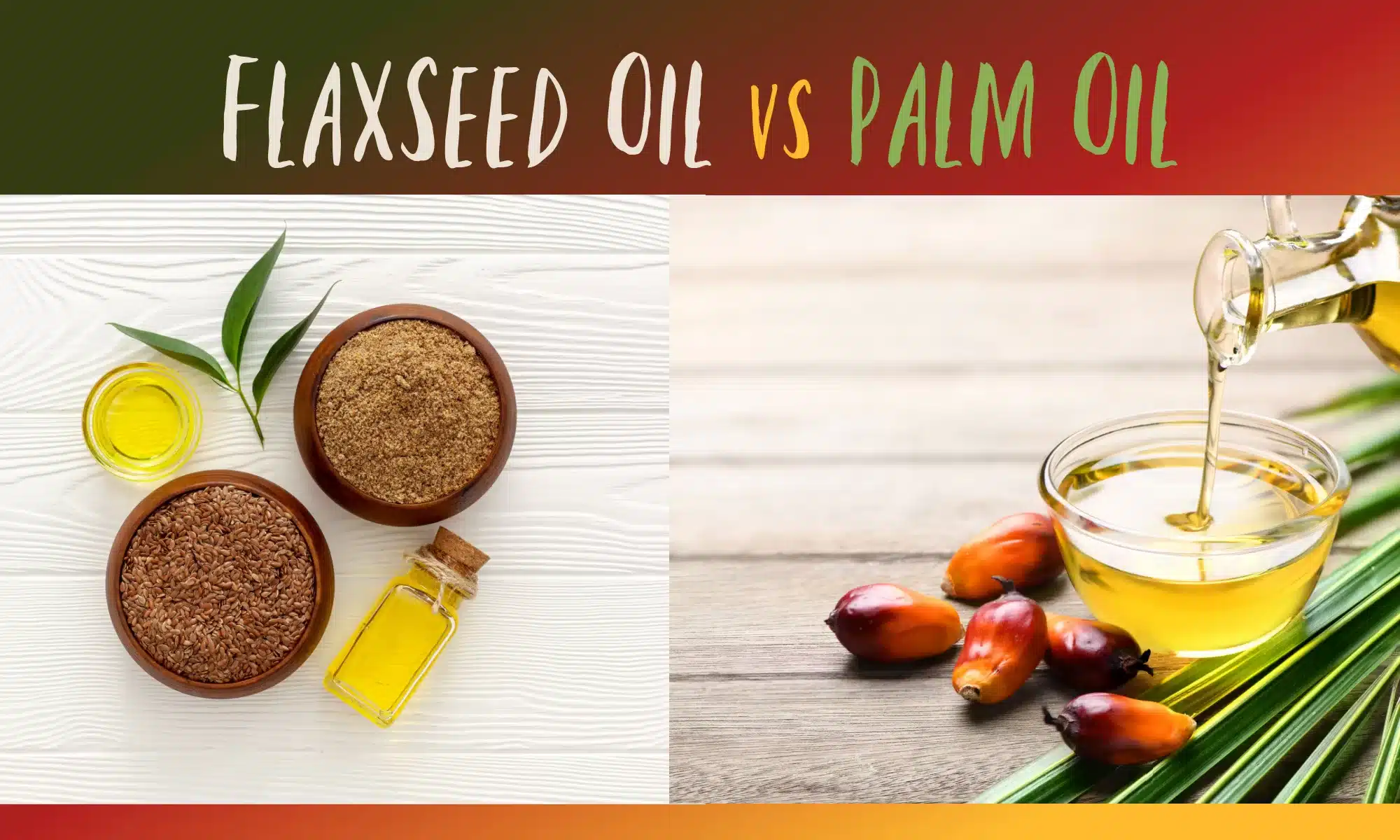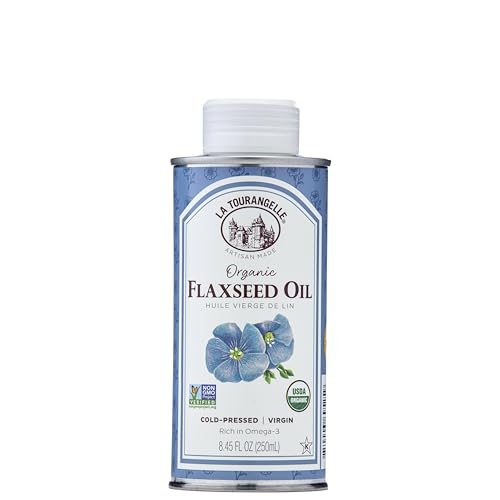Flaxseed oil is a popular and versatile ingredient that has gained attention for its potential health benefits. Derived from the seeds of the flax plant, this oil is rich in omega-3 fatty acids, which are essential for maintaining a healthy diet. With its distinct nutty flavor, flaxseed oil is often used as a dressing on salads or drizzled over cooked vegetables.
But can you cook with flaxseed oil? While it’s true that flaxseed oil has a low smoke point, making it unsuitable for high-temperature cooking methods like frying or sautéing, there are still plenty of ways to incorporate it into your cooking routine.
By using flaxseed oil as a finishing oil or in low-heat cooking methods, such as baking or gentle simmering, you can reap the nutritional benefits while preserving its delicate flavor.
It’s worth noting that flaxseed oil is best enjoyed raw or used in cold dishes to fully experience its distinct taste and nutritional value. Additionally, because flaxseed oil is susceptible to oxidation, it should always be stored in a cool, dark place to maintain its freshness.
Benefits of Cooking with Flaxseed Oil

Flaxseed oil is a popular cooking oil that is extracted from the seeds of the flax plant. It is rich in essential fatty acids, particularly alpha-linolenic acid (ALA), which is an omega-3 fatty acid. Cooking with flaxseed oil can provide several health benefits:
1. Omega-3 fatty acids: Flaxseed oil is one of the best plant-based sources of omega-3 fatty acids. These healthy fats are essential for brain function, heart health, and reducing inflammation in the body. Incorporating flaxseed oil into your cooking can help you meet your omega-3 needs and promote overall well-being.
2. Heart health: The omega-3 fatty acids found in flaxseed oil have been shown to have a positive impact on heart health. They can help reduce blood pressure, lower triglyceride levels, and decrease the risk of heart disease. Using flaxseed oil as a cooking oil can be a heart-healthy choice.
3. Anti-inflammatory properties: Flaxseed oil contains compounds called lignans, which have anti-inflammatory properties. These compounds can help reduce inflammation in the body, which may alleviate symptoms of chronic conditions like arthritis and protect against certain diseases.
4. Digestive health: Flaxseed oil is a natural laxative and can help promote healthy digestion. It can lubricate the intestines, soften stool, and prevent constipation. Adding flaxseed oil to your cooking can support regularity and improve overall digestive health.
5. Nutrient absorption: Cooking with flaxseed oil can enhance the absorption of fat-soluble vitamins like vitamin A, D, E, and K. These vitamins are important for various bodily functions, including immune support, bone health, and blood clotting.
In conclusion, incorporating flaxseed oil into your cooking can provide numerous health benefits. Its omega-3 fatty acids, heart-healthy properties, anti-inflammatory compounds, digestive benefits, and improved nutrient absorption make it a valuable addition to your culinary repertoire. However, it is important to note that flaxseed oil has a low smoke point, so it is best used in low-heat cooking or as a finishing oil.
Flaxseed oil: a healthy cooking alternative
Flaxseed oil is a popular choice for those seeking a healthy alternative in their cooking. Made from pressing flax seeds, this oil has a number of health benefits and is a great addition to a balanced diet.
One of the main benefits of flaxseed oil is its high content of omega-3 fatty acids. These essential fatty acids are crucial for our overall health and can help to reduce inflammation, lower cholesterol levels, and support heart health. Flaxseed oil is even thought to be beneficial for brain health and can help to improve cognitive function.
In addition to omega-3 fatty acids, flaxseed oil is also a rich source of antioxidants. Antioxidants help to protect our cells from damage caused by free radicals, which can contribute to aging and disease. By incorporating flaxseed oil into your cooking, you can increase your intake of these powerful antioxidants and support your overall health.
When cooking with flaxseed oil, it’s important to keep in mind that it has a low smoke point. This means that it is not suitable for high-heat cooking methods such as frying or grilling. Instead, it is best to use flaxseed oil in recipes that require low to medium heat, such as sautéing vegetables or baking.
Flaxseed oil has a mild, nutty flavor that can enhance a variety of dishes. It can be used as a dressing for salads, drizzled over roasted vegetables, or added to smoothies for an extra nutritional boost. Just remember to store flaxseed oil in the refrigerator to keep it fresh and extend its shelf life.
In conclusion, flaxseed oil is a healthy cooking alternative that offers numerous health benefits. Its high content of omega-3 fatty acids and antioxidants makes it a valuable addition to any diet. So why not give flaxseed oil a try in your next culinary creation?
Nutritional value of flaxseed oil
Flaxseed oil is derived from the seeds of the flax plant, also known as Linum usitatissimum. It is widely recognized for its high nutritional value and numerous health benefits.
Flaxseed oil is rich in alpha-linolenic acid (ALA), which is an omega-3 fatty acid. Omega-3 fatty acids are essential fats that play a crucial role in maintaining heart health and reducing the risk of chronic diseases.
In addition to omega-3 fatty acids, flaxseed oil also contains omega-6 fatty acids, which are necessary for brain function, growth, and development. The balanced ratio of omega-3 to omega-6 fatty acids in flaxseed oil contributes to maintaining overall health.
Moreover, flaxseed oil is a good source of vitamin E, an antioxidant that helps protect cells from damage caused by free radicals. Vitamin E also supports immune function and promotes healthy skin and hair.
Flaxseed oil is also high in lignans, a type of phytoestrogen that has been shown to have potential cancer-fighting properties. Lignans may help inhibit the growth of hormone-related cancers, such as breast and prostate cancer.
It is important to note that flaxseed oil should be stored in a cool, dark place to prevent it from going rancid. When using flaxseed oil in cooking, it is best to keep the temperature below its smoke point to preserve its nutritional value.
In summary, flaxseed oil is a highly nutritious oil that offers a range of health benefits. Its rich content of omega-3 and omega-6 fatty acids, vitamin E, and lignans make it a valuable addition to a healthy diet.
Flaxseed oil for heart health

Flaxseed oil is a rich source of alpha-linolenic acid (ALA), which is a type of omega-3 fatty acid. Omega-3 fatty acids are essential for heart health and have been shown to have numerous benefits for cardiovascular function.
Research has indicated that consuming omega-3 fatty acids can help reduce the risk of heart disease by lowering blood pressure, reducing inflammation, and decreasing the formation of blood clots. Flaxseed oil is a natural and plant-based source of omega-3 fatty acids, making it a suitable option for those who follow a vegetarian or vegan diet.
In addition to omega-3 fatty acids, flaxseed oil also contains lignans, which are phytoestrogens that have antioxidant properties. These lignans may also contribute to the heart-healthy benefits of flaxseed oil. Some studies have suggested that lignans may help lower cholesterol levels and improve blood vessel function.
It is important to note that flaxseed oil should not be used as a cooking oil, as it has a low smoke point and can become rancid when exposed to high heat. Instead, flaxseed oil is best used as a dressing or in cold dishes, such as smoothies or salads. This will help preserve its nutritional properties and prevent it from becoming oxidized.
Before incorporating flaxseed oil into your diet, it is advisable to consult with a healthcare professional, especially if you have any underlying medical conditions or are taking medications. They can help determine the appropriate dosage and ensure it is safe for you to consume.
In conclusion, flaxseed oil can be a beneficial addition to a heart-healthy diet due to its high content of omega-3 fatty acids and lignans. However, it is important to use it correctly to preserve its nutritional properties and to consult with a healthcare professional before making any dietary changes.
Cooking tips with flaxseed oil
Flaxseed oil is a versatile and healthy oil that can add a unique flavor and nutritional benefits to your cooking. Here are some cooking tips to help you make the most out of this nutritious oil:
1. Use it as a finishing oil: Flaxseed oil has a delicate and nutty flavor, making it a great addition to salads, dips, and spreads. Drizzle it over cooked vegetables, roasted nuts, or grilled fish to enhance the taste and add a nutritious boost.
2. Avoid high heat: Flaxseed oil has a low smoke point, which means it should not be used for high-temperature cooking methods like frying or sautéing. High heat can degrade the beneficial fatty acids in flaxseed oil and produce harmful compounds. Instead, use it for low-heat cooking or consume it raw.
3. Store it properly: Flaxseed oil is susceptible to oxidation and can turn rancid quickly if not stored correctly. Keep it in a cool, dark place, preferably in the refrigerator, to prolong its shelf life. Make sure to tightly seal the bottle to prevent air exposure.
4. Combine it with other oils: Flaxseed oil can be blended with other oils, like olive oil or avocado oil, to create a delicious and nutritious salad dressing. Mixing it with other oils can also increase its smoke point, making it suitable for slightly higher heat cooking.
5. For baking: Flaxseed oil is not commonly used for baking due to its low smoke point and unique taste. However, it can be used in small amounts in recipes that call for melted butter or oil, such as muffins or quick breads. Make sure to adjust the measurements accordingly.
6. Boost your smoothies: Add a tablespoon of flaxseed oil to your smoothies for a nutritional kick. Its subtle taste blends well with fruits and vegetables, giving you a dose of essential omega-3 fatty acids, fiber, and antioxidants.
In conclusion, flaxseed oil is a healthy addition to your cooking routine. By following these cooking tips, you can enjoy the unique flavor and nutritional benefits of flaxseed oil in your meals.
Questions and answers
Can you use flaxseed oil for cooking?
Yes, you can use flaxseed oil for cooking. It has a low smoke point, so it’s best used for low-heat cooking methods like drizzling over salads or adding to smoothies.
What is the smoke point of flaxseed oil?
The smoke point of flaxseed oil is around 225 degrees Celsius or 437 degrees Fahrenheit. This means that it is not suitable for high-heat cooking methods like frying or sautéing.
What are the health benefits of cooking with flaxseed oil?
Flaxseed oil is rich in omega-3 fatty acids, which are beneficial for heart health. It also contains lignans, which have antioxidant properties. Cooking with flaxseed oil can help promote a healthy diet and may have potential health benefits.
Can you substitute flaxseed oil for other cooking oils?
Flaxseed oil has a distinct nutty flavor, so it may not be the best substitute for all cooking oils. It can be used as a substitute for olive oil in salad dressings or as a topping for cooked vegetables, but it may not work well for high-heat cooking.
How should flaxseed oil be stored for cooking?
Flaxseed oil should be stored in a cool, dark place to prevent oxidation. It is best to keep it refrigerated to maintain its freshness and prevent it from going rancid. It is also important to use it within its expiration date for optimal taste and quality.
Is flaxseed oil suitable for cooking?
Yes, you can cook with flaxseed oil. However, it is important to note that flaxseed oil has a low smoke point, so it is best to use it for low-temperature cooking methods such as sautéing or drizzling over cooked dishes. It should not be used for high-heat cooking methods such as frying or deep-frying.
What are the health benefits of cooking with flaxseed oil?
Cooking with flaxseed oil can offer several health benefits. Flaxseed oil is rich in omega-3 fatty acids, which are essential for heart health and can help reduce inflammation in the body. It also contains lignans, which have antioxidant properties and may help protect against certain types of cancer. Additionally, flaxseed oil is a good source of vitamin E, which is important for skin health.






